Antibody data
- Antibody Data
- Antigen structure
- References [0]
- Comments [0]
- Validations
- Immunohistochemistry [5]
Submit
Validation data
Reference
Comment
Report error
- Product number
- PA5-58325 - Provider product page

- Provider
- Invitrogen Antibodies
- Product name
- TEX12 Polyclonal Antibody
- Antibody type
- Polyclonal
- Antigen
- Recombinant protein fragment
- Description
- Immunogen sequence: MANHLVKPDN RNCKRPRELE SPVPDSPQLS SLGKSDSSFS EISGLFYKDE ALEKDLNDVS Highest antigen sequence identity to the following orthologs: Mouse - 80%, Rat - 78%.
- Reactivity
- Human
- Host
- Rabbit
- Isotype
- IgG
- Vial size
- 100 μL
- Concentration
- 0.05 mg/mL
- Storage
- Store at 4°C short term. For long term storage, store at -20°C, avoiding freeze/thaw cycles.
No comments: Submit comment
Supportive validation
- Submitted by
- Invitrogen Antibodies (provider)
- Main image
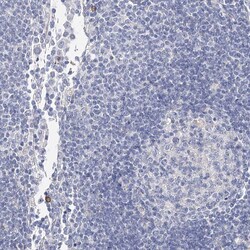
- Experimental details
- Immunohistochemical staining of TEX12 in human lymph node using TEX12 Polyclonal Antibody (Product # PA5-58325) shows no positivity in non - germinal center cells as expected.
- Submitted by
- Invitrogen Antibodies (provider)
- Main image
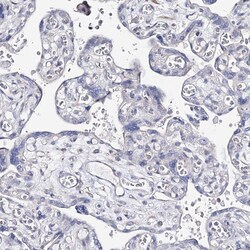
- Experimental details
- Immunohistochemical staining of TEX12 in human placenta using TEX12 Polyclonal Antibody (Product # PA5-58325) shows no positivity in trophoblastic cells as expected.
- Submitted by
- Invitrogen Antibodies (provider)
- Main image
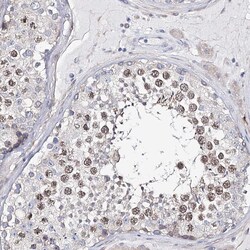
- Experimental details
- Immunohistochemical staining of TEX12 in human testis using TEX12 Polyclonal Antibody (Product # PA5-58325) shows nuclear positivity in spermatids.
- Submitted by
- Invitrogen Antibodies (provider)
- Main image
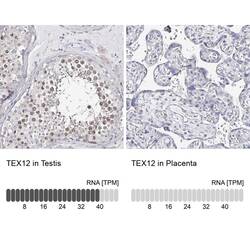
- Experimental details
- Immunohistochemical staining of TEX12 in human testis and placenta tissues using TEX12 Polyclonal Antibody (Product # PA5-58325). Corresponding TEX12 RNA-seq data are presented for the same tissues.
- Submitted by
- Invitrogen Antibodies (provider)
- Main image
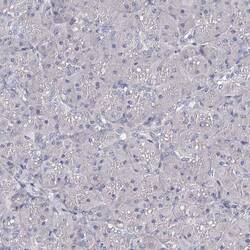
- Experimental details
- Immunohistochemical staining of TEX12 in human pancreas using TEX12 Polyclonal Antibody (Product # PA5-58325) shows no positivity in exocrine glandular cells as expected.
 Explore
Explore Validate
Validate Learn
Learn Western blot
Western blot Immunohistochemistry
Immunohistochemistry